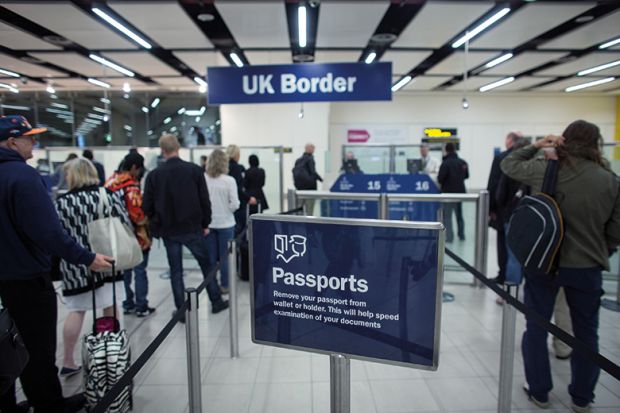An email asking staff at the University of York to check whether foreign visitors to their department have visas has raised concerns about the increasingly strict approach to immigration rules in UK higher education institutions.
The message from York’s human resources compliance team asks staff to detail who their visitors are, where they are from and what they are doing in the UK – whether they are giving lectures, conducting research or attending meetings.
As well as whether visitors have visas, other questions York academics must answer include how long visitors are staying for and whether any payment is made to them, including expenses.
The email says that the “visitors project” is aimed at “helping us reduce the university’s right to work and sponsorship risks”.
“Along with other universities who are also reviewing their processes in these areas, we are now looking to identify and understand the different types of visitors we welcome to the university,” writes compliance officer Kari Methven.
“Once we have collated the visitors’ details, the next step is to assess if there is any requirement for a right to work check and the level of risk this may bring.”
Ms Methven adds: “Our legal obligation as an employer and sponsor is to ensure that all work carried out on our behalf is done so by a person who has the right to do the work, whether this is on a paid or unpaid basis.”
One York academic, who wished to remain anonymous, described the email as “problematic”.
“It’s very discomfiting to see this kind of surveillance happening,” the academic told Times Higher Education. “People who visit us tend to be doing us a favour rather than the other way round. They come to talk to students or to us and ironically they are not getting paid – it’s out of goodwill.
“So the idea that we need to monitor this so we can report to the Home Office is worrying. It’s a slippery slope.”
Christian Dustmann, director of the Centre for Research and Analysis on Migration, said that he shared these concerns.
“I think it is very unfortunate that academics are basically [being] put in a position of proxy border guards to implement such systems, particularly as higher education is such an important part of our exports,” he said.
The York email asks staff to say approximately how many visitors of different types – students, researchers or invited speakers – they had each year.
It says that the information would be collated “in order to assess the types of visitors against Home Office regulations to understand the risk. We will then make recommendations to the university as to how visitors should be managed in the future, based on these risks.”
While she could not comment on individual cases, Smita Jamdar, head of education at law firm Shakespeare Martineau, said that universities are feeling “real pressure” from the Home Office.
“The underlying risk institutions are worried about is losing their right to sponsor workers because they’ve inadvertently failed to comply with immigration rules,” she said.
A York spokeswoman said: “We want to continue recruiting and working with the best academics and students from around the world without the challenges of visa restrictions. We want those rights to be protected and guaranteed for the future.”
Register to continue
Why register?
- Registration is free and only takes a moment
- Once registered, you can read 3 articles a month
- Sign up for our newsletter
Subscribe
Or subscribe for unlimited access to:
- Unlimited access to news, views, insights & reviews
- Digital editions
- Digital access to THE’s university and college rankings analysis
Already registered or a current subscriber? Login








